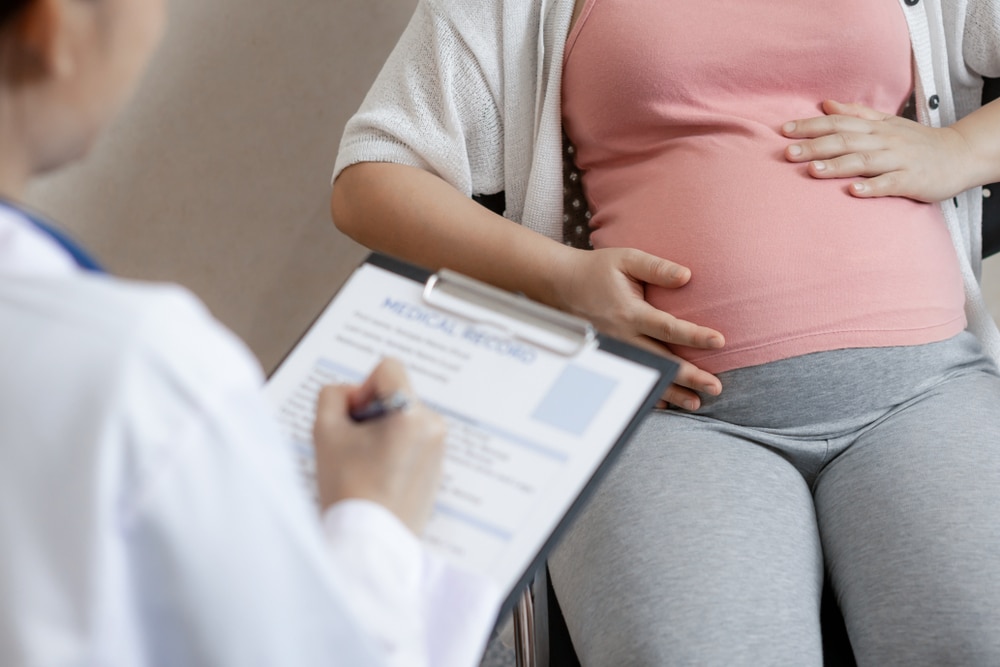Should I Go to the ER for Bleeding During Pregnancy?
When to Go to the ER
•
May 5, 2021

At some point or another, many expecting women find themselves wondering, “Should I go to the ER for bleeding during pregnancy?” Frustratingly, the answer to this question is often less straightforward than many women would like.
That’s because vaginal bleeding during pregnancy can be a sign of miscarriage or other pregnancy problems. But at the same time, bleeding during pregnancy (especially during the first trimester of pregnancy) is fairly common, with 15-25% of women experiencing light bleeding in that time, according to the American College of Obstetricians and Gynecologists.
If you are confused about what to do if you start bleeding while pregnant, we have created a straightforward guide about when you should and shouldn’t go to the ER for bleeding during pregnancy.
Should you decide your situation is an emergency, Complete Care’s 24-hr. emergency walk-in clinics are located across Texas and Colorado. We offer quality, award-winning care with minimal wait times.
When to see a doctor for spotting during pregnancy: light bleeding
Pregnant women are constantly being told things to worry about while being pregnant. For that reason, we do want to stress that not all bleeding during pregnancy is a sign of an emergency. In other words, the answer to the question, “Should I go to the ER for bleeding during pregnancy?” is not always yes.
There are many cases when light bleeding during pregnancy is perfectly normal. These include:
- Egg implantation: When an egg becomes fertilized, it implants into the lining of your uterine wall. Light bleeding may occur after implantation, typically right before or around the same time as when you would expect your period.
- Hormone changes: Your body experiences a lot of hormonal changes during pregnancy. Some of these changes may light to heavy bleeding (especially the luteal-placental shift, which occurs between weeks 7-9).
- Bleeding after cervical irritation: Blood flow increases to your cervix during pregnancy, and hormonal shifts can also make your cervical lining more sensitive. Both of these changes make it more likely that you may experience bleeding after cervical irritation caused by sex or even a vaginal ultrasound.
The bleeding caused by the aforementioned cases will likely be brown and should not be heavy. If you experience light bleeding or spotting (bleeding that does not soak through a pad) for less than 24 hours, this is likely not an emergency. We recommend that you tell your OB-GYN about this bleeding during your next prenatal appointment or, if you are worried, give them a call.
However, if you experience light bleeding for more than 24 hours, call your OB-GYN within the day and request an appointment.
Potential emergencies: Heavy bleeding or bleeding with additional symptoms
Unfortunately, there are times when the answer to, “Should I go to the ER for bleeding during pregnancy?” is yes. If you experience any of the following while pregnant, contact your doctor immediately. They will advise you on whether or not to seek emergency treatment. If you cannot reach your provider, go to your nearest emergency room.
- Heavy bleeding: Period-like bleeding or heavier, particularly if you soak through a pad in less than an hour.
- Bleeding with pain, cramping, fever, or chills: If you experience heavy or light bleeding in addition to pain, cramping, fever, or chills, this may be a sign that there are issues with the pregnancy.
- Passing tissue: Seek immediate medical attention if you notice tissue in your blood, as this may be a sign of miscarriage. If possible, collect the tissue and bring it with you.
During the first and second trimester of pregnancy, experiencing the aforementioned symptoms may be a sign of miscarriage or an ectopic pregnancy (when the fertilized embryo implants itself outside of the uterus). During the third trimester, experiencing these symptoms may be a sign of miscarriage or placenta abruption (when the placenta separates from the inner wall of the uterus before birth).
Not sure whether to go to the ER or urgent care? See our guide to the difference between urgent care and ER.
FAQ: When should I worry about miscarriage bleeding?
Miscarriage occurs more than most people know, with an estimated 1 in 8 pregnancies ending in miscarriage. The chances of miscarriage are highest earlier in pregnancy (around 30% during the first week) and fall dramatically (down to 1%) after 14 weeks — roughly the end of your first trimester of pregnancy. To check your chances of miscarriage by week, please see this miscarriage probability chart.
When you need to go to the ER during pregnancy, visit Complete Care for quality treatment
If you find yourself having to ask, “Should I go to the ER for bleeding during pregnancy?” the health experts at Complete Care recognize that you may be feeling anxious and afraid. Please know that we are here for you and your family 24/7 to address any emergency health concerns you may have.
If you can’t get a hold of your OB-GYN or simply aren’t sure if you’re experiencing emergency pregnancy symptoms, give us a call or visit any of our many ER locations in both Texas and Colorado.
We are known for our award-winning treatment (just check out our Complete Care testimonials!) and, as a freestanding emergency room, can see most of our patients in a matter of minutes, not hours.
Simply walk in and let us take complete care of you today.
More Helpful Articles by Complete Care:
